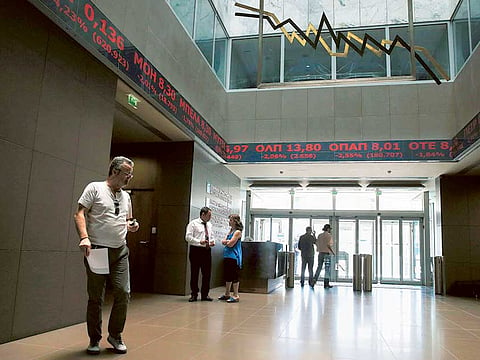All eyes on Europe as politics frustrates economic harmony
Drama shifts from Middle East while investors wait for sentiment boost

So Greece is the word this week, trumping even the timing of the Fed’s eventual rate hike in terms of its importance to global markets. Events now are playing out towards a denouement that followed inevitably from severe intransigence on the two sides of a well-merited argument.
Last week’s resumption of volatility in peripheral European bond markets showed that the contagion effect of a default and potential departure from the Eurozone could not be isolated from the collective imagination as if it was merely a localised tragedy concerning a small country with a fabled and turbulent history. The attendant issues are undoubtedly big all around.
What happens to Greece matters for the coherence of the euro story as told to international traders, with an immediate consequence for the dollar and associated currencies (like the Gulf’s) at the very least, and for expectations on all sides about the continuation of world economic recovery, even now, away from deep, global financial crisis.
Regardless of the battle of wills between core Europe and its unco-operative outlier, the idea of the Eurozone crumbling at its edges isn’t in the script for peaceful, profitable investment practice, though it doubtless excites those funds which speculate on distress.
Crucially, it’s simply not part of the European plan to allow anyone out of the building; the Greeks know it, and don’t even actually want to leave, which is why the failure of any meeting of minds from opposing standpoints would always persist to the last moment, in a relentlessly calculated but still emotional gamble.
It’s a matter totally of conjecture as to how events will unfold from here, except to say that, whereas the idea of calamity is massively overblown for rhetorical purposes — and has nothing to do with how Greece or the EU might prosper over time — an intense sense of danger is bound to inform the debates ahead.
The special concern from the rest of the world’s perspective has to be whether Europe can get its act together in keeping monetary union intact, long enough to force into shape the developing political union that it requires and was designed to foster.
If nothing else, Greece has to get past its claim to be a sovereign state, as its premier suggested only days ago. No country in the EU is remotely that — let alone without its own independently-managed currency as in the Eurozone — since the multi-decade programme guiding the whole bloc is progressively to erode national democracy. A federal superstate is planned, with fewer differences between members than between the constituent states of the USA.
Bold though that statement might seem, it should not be remotely contentious among honest discussants, according to documented history. Interpreting what’s going on now is therefore like peering through a fog of falsity. Neither the euro nor Greece’s participation in it make economic sense, so the issue in the coming days will be overwhelmingly political and must be interpreted accordingly.
To some extent, though, international investors have fully recognised both that the European policymakers have every incentive to keep the family, however dysfunctional, together, given the nature of the project and the turmoil that would arise from its undoing. Hence their willingness to keep a measure of faith in European assets, and the slowness yet in market fallout.
That’s not complacency so much as (a) understanding the balance of risks, and (b) having hardly anywhere else to go but the mainstream developed blocs. Otherwise, the returns on cash are negligible in the extreme, and huge uncertainty reigns over emerging markets, particularly in the face of the likely repatriation to US assets when the Fed finally shifts just a little away from emergency policy.
As to stepping to the sidelines, wealth and fund managers rarely park any significant portion of the funds they control in deposits, even when they actually yield an income, because it undermines their rationale with regards to clients. Also, individual investors tend to stay on the bandwagon of any trend till it’s too late, either scared of missing out on whatever further rewards are available or of getting out too soon and having no better alternative in pursuit of their targeted returns.
Turbulence remains due, and the local markets in the GCC at present are understandably cautious in their movements, lacking confidence both in the international scene and relatedly in the prospect for significantly higher oil prices that would spur the region’s indexes.
While the US locomotive holds some promise for world demand, its most obvious impact is actually on the supply side, through shale, and the other blocs remain in relatively stretched circumstances.
Thus, the best hope for traders and investors is probably for a continuing fudge and muddling through that will keep stock prices ticking over quietly. Meanwhile, world finances still look like a serious accident waiting to happen.
Sign up for the Daily Briefing
Get the latest news and updates straight to your inbox



